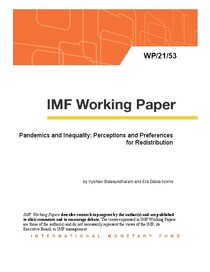Pandemics and inequality: perceptions and preferences for redistribution

Balasundharam, Vybhavi ; Dabla-Norris, Era
IMF - Washington, DC
2021
43 p.
epidemic disease ; social inequality ; income redistribution ; government policy ; economic policy
IMF Working Paper
WP/21/53
Income distribution
English
Bibliogr.
"This paper uses an individual-level survey conducted by the Edelman Trust Barometer in mid-April for 11 advanced and emerging market economies to examine perceptions of government performance in managing the health and economic crisis, beliefs about the future, and attitudes about redistribution. We find that women, non-college educated, the unemployed, and those in non-teleworkable jobs systematically have less favorable perceptions of government responses. Personally experiencing illness or job loss caused by the pandemic can shape people's beliefs about the future, heightening uncertainties about prolonged job losses, and the imminent threat from automation. Economic anxieties are amplified in countries that experienced an early surge in infections followed by successful containment, suggesting that negative beliefs can persist. Support for pro-equality redistributive policies varies, depending on personal experiences and views about the poor. However, we find strong willingness to provide social safety nets for vulnerable individuals and firms by those who have a more favorable perception of government responses, suggesting that effective government actions can promote support for redistributive policies."
Digital
The ETUI is co-funded by the European Union. Views and opinions expressed are however those of the author(s) only and do not necessarily reflect those of the European Union or the ETUI.